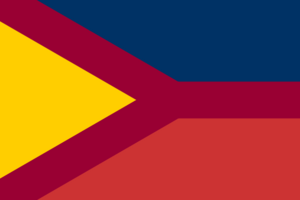Verse:Cape State
Cape State Stata iKápa The Cape | |
|---|---|
|
Flag | |
| Motto: Liberta en Ukalukaw Liberty and Diversity | |
| Capital and largest city | Cape Town |
| Official languages | Cápa, Afrikaans |
| Recognized languages | Zulu, Xhosa |
| Recognized regional languages | Tsonga, Sotho, Tswana |
| Demonym | Caper |
| Government | Constitutional parliamentary democratic republic |
| Establishment | 1961(Independence from the British Empire) |
| Population | |
• Estimate | 15,678,452 (74th) |
| GDP Template:Nobold | estimate |
• Total | $338.964 billion |
| Gini | 29 low inequality |
The Cape, officially the Cape State, is a country in southern Africa. It has a population of over 15 million people, 13 million of which speak(natively or otherwise) one of the official languages and lingua franca of the nation, Cápa, which is a creole language that developed from Portuguese, Dutch and English as well as the East Bantu languages of Zulu and Xhosa. Additionally, Afrikaans is also an official language, although this is largely a ceremonial law, as very few speakers of the language remain in the country(with the vast majority of Afrikaans speakers living in the neighbouring nation of Orange-Transvaal, where it is the official language and lingua franca).
Politics
Cape State is a parliamentary democratic republic, with a president(Sandile van Koch) as head of state and prime minister(Ciko Ánzo) as head of parliament. General elections for president are held every four years and candidates are voted on by the vote-eligible(citizens over 18) population. New prime ministers are voted on by Members of Parliament(MPs, or pharambantu colloquially) in parliamentary elections, where the general public votes for MPs and said newly elected MPs then vote and elect a new prime minister.
Diplomacy
Internationally, the Cape is officially neutral, however due to their internal democratic political structure they tend to lean diplomatically towards NATO and democratic powers such as the USA as a whole.
Relations with Orange-Transvaal
Orange-Transvaal consider the Cape an economic and diplomatic rival, and vice versa. Thus, since both countries' independence in 1961, they have always treated each other with at least some degree of mistrust. They have gone to war against each other three times since their independence, with each war having peace negotiated by one of the region's former colonisers(Portugal, Treaty of Luanda, 1966; the Netherlands, Treaty of Rotterdam, 1974; the United Kingdom, Treaty of Bristol, 1981).
Both countries also belong to two different international alliances. Both are still officially neutral in international politics, but Orange-Transvaal leans more towards BRICs and more autocratic governments like China, while the Cape, as aforementioned, supports NATO and more democratic governments like the US.
